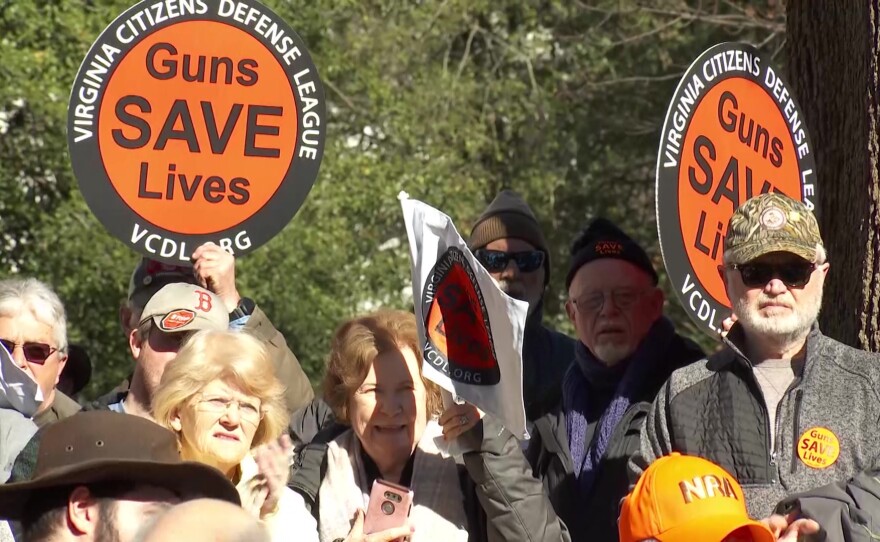TRANSCRIPT OF VIDEO
EDWARD WEEDEN: I was involved in a mass shooting four years ago. I saw the guy shoot a girl on the stairway. She went down. I lost 13 friends that day, over a disgruntled employee.
EMMANUEL TAMBAKAKIS: In 2019, Ed Weedon witnessed a mass shooting in a Virginia Beach government building where he worked. He believes that no one should have a gun.
EDWARD WEEDEN: I was in the military, I still don't support it. I was involved in a mass shooting, I still don't support it. You will never get me convinced that gun rights are important.
PHILIP VAN CLEAVE: Your right to bear arms protects your right to be alive, protects your life, your liberty. So they're not exclusive at all. Now, they have to reach a very high bar to have any kind of constitutional gun control.
EMMANUEL TAMBAKAKIS: Philip Van Cleave leads a pro-gun group, famous for organizing an annual Lobby Day for thousands of activists from around the country. They march with assault weapons to the Virginia Capitol, advocating for their Second Amendment rights in the Constitution of the United States.
PHILIP VAN CLEAVE: It says that a well-regulated militia necessary to the security of a free state, the right of the people to keep and bear arms shall not be infringed. Now, I emphasize that because it didn't say the right of the militia to keep and bear arms. It said the right of the people, you and me. It means the right to protect myself, my family, even another innocent if I were in a position where I felt, you know, I knew exactly what was happening and an innocent person was about to be killed or grievously hurt, I could intervene legally. It means the right to protect my country if something happened.
LORI HAAS: I saw just more pain than I can describe.
EMMANUEL TAMBAKAKIS: Lori Haas's daughter was shot, but survived the mass shooting at Virginia Tech. The events of that day turned Haas into a gun control advocate.
LORI HAAS: On the morning of April 16th, 2007, I got a phone call from my daughter saying, you know, "Mommy, I've been shot." You know, "There's shootings everywhere, it's bad." "It's really bad." 32 students and staff were killed that day. Another 17 were injured by gunfire, and another seven were injured jumping out a second story window, trying to save their lives. The Virginia Tech massacre is the third worst in the country. I work for the Johns Hopkins School of Public Health, advocating for policy and change in Virginia. I think there is opportunity to intervene and prevent gun violence, and I think we should be doing more. I think that when we look at rights and we fathom that they're absolute and that they apply in any and every situation, we forget the common good. I have the right to walk down the street and feel safe, and feel safe from people who might be carrying a firearm, you know, with the intent to do harm or commit firearm death or injury in public spaces.
JOHN CUEBAS: I have a right to live, and I do have the right to keep and bear arms. I do both, I live and I use my right to keep and bear arms as my protection.
EMMANUEL TAMBAKAKIS: And John Cuebas teaches others how to handle firearms safely.
JOHN CUEBAS: I do believe in the Constitution though, but times have changed. You know, there's a lot of people with bad intentions, and they need to be screened to get a firearm, but if nothing comes up negative and they're allowed to have it, I'm all for it. There are groups of people who don't like guns, period. You know, they feel that guns kill people, but it's not guns that kill people. It's people that kill people, guns in the wrong hands.
LORI HAAS: I have heard the sentiment, "Guns don't kill people. People kill people." and that's what we work on. Who are those people? Who's at risk of committing gun violence and let's prohibit them from having firearms, either permanently or temporarily.
JOHN CUEBAS: I believe that most people feel uncomfortable with firearms is because the way they were raised, you know, they either weren't around firearms, they didn't hunt, they didn't do anything that involved firearms, where, you know, I can talk to them, you know, and try to convince them, but that's all I can do.
LORI HAAS: The pain and suffering that families endure never goes away. You know, there is not closure. There's a hole in someone's heart for their lifetime, and I'm committed to doing all I can to intervene and prevent gun violence in all its forms.
PHILIP VAN CLEAVE: Do they feel the same way about automobiles on expressways? I mean, gosh, we lose 40, 50,000 people a year to automobile accidents. Do they feel that way about automobiles? That'd be my question to them, because what I do in my life doesn't affect them. You know, so they just don't like guns and therefore, they consider it infringing upon their freedom to be in a world without guns. Well, sorry, there is no such freedom.
EDWARD WEEDEN: It's about life. You're born and then you die. You know, you're not born to get killed by a gun. No city and no person is immune from it.
LORI HAAS: It's a public health epidemic that we're not doing enough about, and we should be doing more, and we should be addressing it in ways where we can intervene and prevent harm and prevent death and injury.







